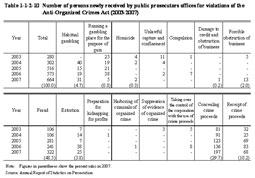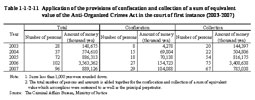| Previous Next Index Image Index Year Selection | |
|
|
9 Organized crime Since the enforcement of the Anti-Organized Crimes Act in 2000 the number of persons newly received by public prosecutors offices has continued to increase. In 2007 “fraud” was the most common, followed by “concealing crime proceeds” and “receipt of crime proceeds”, in that order. Table 1-1-2-10 Number of persons newly received by public prosecutors offices for violations of the Anti-Organized Crimes Act (2003–2007) Table 1-1-2-11 shows the application of the provisions of confiscation and collection of a sum of equivalent value of the Anti-Organized Crimes Act at the court of first instance over the last five years.Table 1-1-2-11 Application of the provisions of confiscation and collection of a sum of equivalent value of the Anti-Organized Crimes Act in the court of first instance (2003–2007) Moreover, in regard to organized crimes, the Bill on Partial Amendment to the Penal Code and Other Acts in Response to Globalizing and Systematized Crimes and Advanced Information Processing was introduced to the 163rd session of the Diet and is under continuous deliberation at the 170th session of the Diet. Considering the recent situation concerning globalizing and organized crimes and advanced information processing, this Bill contains the following: (1) in order to conclude the U.N. Convention against Transnational Organized Crime, conspiracy of organized crimes and bribery for witnesses, etc. shall be newly specified as criminal offenses, and regulations concerning crime proceeds shall be developed including the expansion of the scope of crime subject to confiscation or collection of the corresponding value to be confiscated; (2) in order to appropriately deal with such offenses as malicious and persisting obstruction of compulsory execution committed in an organized manner, legislation shall be developed, such as expanding the scope of acts of obstructing compulsory execution to be punished and raising statutory penalties for such acts; and (3) in order to deal with high-tech crimes and conclude the Convention on Cybercrime, penal regulations for creation of electromagnetic records of unauthorized commands (computer virus) and regulations for procedures to collect evidence on recording media pertaining electromagnetic records shall be developed. |

